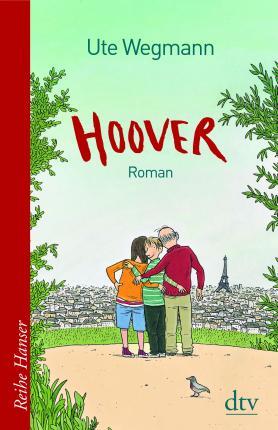Ute Wegmann
Hoover
[Hoover]
- dtv
- Munich 2015
- ISBN 978-3-423-64015-2
- 205 Pages
- 6 Suitable for age 7 and above
- Publisher’s contact details
Ute Wegmann
Hoover
[Hoover]
Published in Arabic with a grant from Litrix.de.
Sample translations
A practical lesson in life’s realities - How a 12-year-old boy afflicted by the challenges of everyday life manages to sort things out
A completely normal family in a large German city. Educated middle class. But bothered all the same by a couple of downsides that don’t exactly make everyday life any easier for the various individual members of the family. Especially not for this one - Hoover - who’s right in the middle of the upheavals that puberty inflicts on 12-year-old boys, and not infrequently causes them to lose their sense of what’s what. There are two older siblings - twins, too, which makes things even worse - who make his life extra-difficult. His parents are plainly happy, though because of their jobs they have to live apart. His father, an art historian, has a university job in a distant city. And what about his lovely mother? Well, she’s very stressed out these days: after many years as a housewife she is training to be a physiotherapist, and her final exams are only just around the corner. As a result she chooses at times to close her maternal ear to the worries and troubles of her darling children. At least there’s Grandpa Kurt, though: recently widowed, he serves as young Hoover’s one true friend, a sort of rock in the midst of turbulent times. But unfortunately the old man’s weak heart keeps giving him trouble.
Given the constrictions inherent in life within a small family, even when softened by the presence of a lovable grandfather, it is no wonder that Hoover feels the need for a best friend of his own age. And it is likewise no wonder that both his eye and his mind get hooked on a Year 9 girl. She strikes him as being different from all the others – at least that’s the conclusion he comes to when he sees her steal a jar of marmelade from the local supermarket.
This is Ute Wegmann’s starting point, and by deploying her supreme skill as a storyteller to juggle and play with its various constituent elements, she weaves them into an exciting, life-affirming tale with an unexpected plotline, yet without ever leaving the realm of the plausible. She spins a narrative that has no need to take recourse to parallel universes or dream worlds, but instead shows the youngsters that present-day life itself is well worth living. Without any semblance of missionary zeal she opens up their hidden potential and - particularly in the case of Hoover, so buffeted by the tribulations of life - she offers new perspectives based on self-belief, dependable friendships, and a real sense of empathy. At the start of the story he doesn’t yet have the faintest clue that Claudine, the Year 9 girl - half French, half German - is going to become his first true friend, or perhaps even his first true love. Indeed, how clued up can a 12-year-old boy possibly be when his heart pounds with excitement at the very thought of Claudine?
In this story of Ute Wegmann’s, Hoover and Claudine become a sort of miniature ‘dream team’ in the process of being put through their paces. Between them they seek to pull off something that they could never have even dreamt of at the outset. They set out to celebrate Grandfather Kurt’s 79th birthday by giving him the biggest surprise of his life. Do they succeed? Well, at least their plan is a perfeect means for them to overcome their fear of their own boldness - but that is as much as we shall reveal.
Basing herself on the life of a family that has remained intact despite numerous difficulties, Ute Wegmann constructs a credible utopia in the form of a mini-world within the overpowering world at large - a world in which realisable dreams and fantasies are frequently abandoned out of obeisance to to the cost/benefit principle, or even out of plain, straightforward fear. In this gentle but none the less exciting book we can see just how much scope for lively story-telling lies hidden even within the life of a completely standard-issue chaotic family. And we can see, too, how fond the author is of her characters, whatever their quirks and faults. And who, at some point or other in their life, wouldn’t like to be a brilliant Hoover making short shrift of all the problems lurking on and under the carpet?
Translated by John Reddick

By Siggi Seuß
Siggi Seuß, freelance journalist, radio script writer and translator, has been writing reviews of books for children and young people for many years.
Publisher's Summary
Is it okay to do something forbidden if you have only the best intentions?
Twelve-year-old Hoover (whose real name is Tim) could never have put his plan into action on his own. It’s a pretty adventurous one: he wants to fulfil his grandfather’s heart’s desire for his birthday and take him to Paris.
But how is he going to go about it? His parents would never allow it, especially in view of grandfather’s weak heart. And Hoover certainly hasn’t got any money—but he does have Claudine. Courageous, self-possessed—and half French as well! Hoover thinks she’s great! And in fact Claudine has several good ideas, one of which is really quite brilliant, but unfortunately rather risky...
Has Hoover got the courage to pull off such an audacious plot on the sly? It's for his Granddad, after all!
(Text: dtv)
